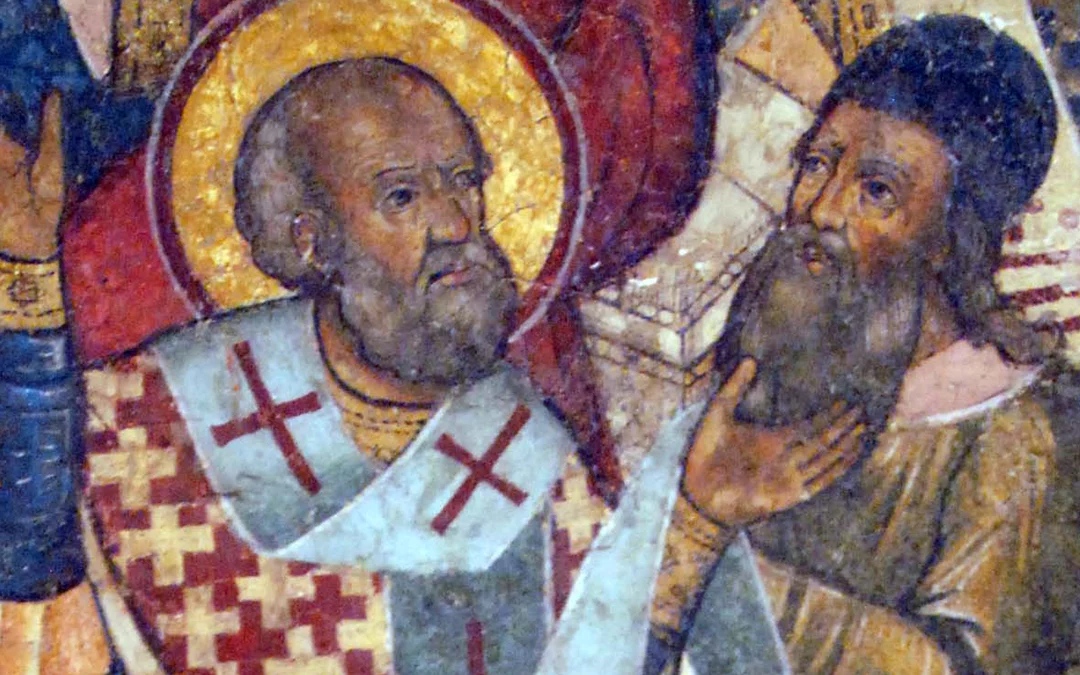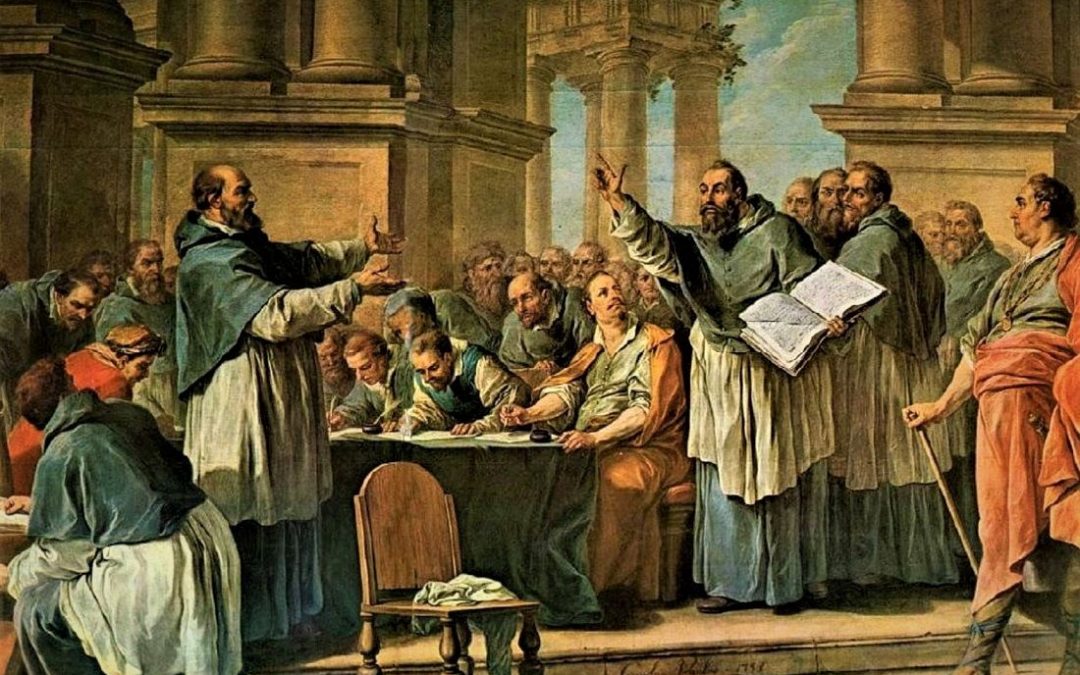It takes time and humility to think through the far-reaching theological implications of trinity. When we confess, “God is triune,” what do we mean? An initial answer to that question might be, “We mean that God is one God in three Persons—Father, Son, and Holy Spirit.” True enough. But in the pell-mell of current trinitarian debate, the implications of the simple, uncontroversial statement, “God is Father, Son, and Holy Spirit” are stunted by a strange, yet understandable, adversity toward certain extra-biblical terms and the scholastic oven in which they were baked.
I say it is both strange and understandable. Strange because this is an age-old orthodoxy. The timeline of church history spans much further back than the last few decades and should cause us to regularly re-examine ourselves in light of Scripture and what Christians have believed Scripture has taught for the last 2,000 years. It shouldn’t be a surprise when we find we’ve made mistakes, and it shouldn’t be a problem to adjust course once we discover them. But the adversity is likewise understandable precisely because of this decades’ old ignorance we’ve all experienced to one extent or another. These terms and their meaning may not be new, but they are new to us. Yet, the last few years have enjoyed a constantly flowing stream of historical resourcement and doctrinal retrieval, not only from the high medieval period, but also from the patristics, the Reformation, and the post-Reformation.[1] Thus, a learning curve ought to be expected.
The following article is intended to be an irenic assistance in overcoming such a learning curve. I have decided to build off a statement most people reading this article will agree with, “God is Father, Son, and Holy Spirit.” I will seek to show that this statement is but a simple summary of the more technical formulation, that God is one essence subsisting in Father, Son, and Holy Spirit.
God Is Father, Son, and Holy Spirit
I’m not going to jump through hoops in defense of this statement. It will suffice to note that its denial would imply that Father, Son, and Holy Spirit are not coequal. If all that is God is not Father, Son, and Holy Spirit, then one or more Persons may be said to be “less God” than another—a nonsensical suggestion, to be sure, but one that is substantively identical to Arianism.
If God just is Father, Son, and Holy Spirit, then all that can and must be said of the one God of Scripture must be likewise said of all three Persons. To quote the Athanasian Creed, “Similarly, the Father is almighty, the Son is almighty, the Holy Spirit is almighty. Yet there are not three almighty beings; there is but one almighty being.”[2] If God is power, then Father, Son, and Holy Spirit just are that power. If God is glory, then Father, Son, and Holy Spirit just are that same, single glory that God is. More technically, the Second London Baptist Confession of Faith reads, “In this divine and infinite Being there are three subsistences, the Father, the Word or Son, and Holy Spirit, of one substance, power, and eternity, each having the whole divine essence, yet the essence undivided…” (2LBCF 2.3)[3] Ergo, God just is Father, Son, and Holy Spirit.
What is lost in the current discussion is the fact that when we say “divine essence” we just mean “God.” So, when we say “the divine essence just is Father, Son, and Holy Spirit,” or that it “subsists as Father, Son, and Holy Spirit,” we are saying “God just is Father, Son, and Holy Spirit.” The purpose of the more technical language of “essence” and “person” is to denote the manner in which the one God (divine essence) exists or, more properly, subsists. So, when we say, “God exists in Father, Son, and Holy Spirit,” we might more technically say, “the manner in which the one divine essence subsists is Father, Son, and Holy Spirit.” Hence, the now-unfamiliar language of the Second London Confession, “In this divine and infinite Being there are three subsistences, the Father, the Word or Son, and Holy Spirit…” A “subsistence” just being the manner in which the one God subsists.
Some Implications
We need to think through our theology, and part of thinking through our theology is a conscious effort to remain consistent. The simple statement, “God is Father, Son, and Holy Spirit,” is uncontroversial, but it’s also incongruous with several contemporary beliefs about God. For example, eternal relational authority submission (ERAS) teaches that Christ is in eternal submission to the Father. This means that the Father must have a superior authority to that of the Son’s. How does this fit with what we’ve already said above? Remember what we said above, “…all that can and must be said of the one God of Scripture must be likewise said of all three Persons.” But since ERAS opines a higher authority in the Father than is in the Son, all that may be said of God cannot be said of both Father and Son. We cannot say that the same divine authority, or power for that matter, may be commonly said of both Father and Son. For the Father has a higher and thus distinct authority from that of the Son.
Fundamentally, ERAS must reject the clause in the Athanasian Creed that says, “Nothing in this trinity is before or after, nothing is greater or smaller; in their entirety the three persons are coeternal and coequal with each other.” Not only this, but it must also reject the very uncontroversial claim that “God just is Father, Son, and Holy Spirit.” What that one God is cannot be commonly asserted of all three Persons. Of course, ERAS proponents verbally affirm the unity of divine nature among Father, Son, and Spirit. Bruce Ware writes:
[ERAS] holds that God reveals himself in Scripture as one God in three persons, such that the Father, Son, and Holy Spirit are fully equal in their deity as each possesses fullyand eternally the one and undivided divine nature; yet the Father is revealed as having the highest authority among the Trinitarian persons, such that the Son, as agent of the Father, eternally implements the will of the Father and is under the Father’s authority, and the Holy Spirit likewise serves to advance the Father’s purposes fulfilled through the Son, under the authority of the Father and also of the Son.[4]
Ware confesses the unity of nature between Father and Son. At the same time, he alleges that the Father has a higher authority than that of the Son. But if the authority of the Father isn’t the authority of the Son, how could Ware possibly maintain the orthodox Trinitarian formula, “God is Father, Son, and Holy Spirit”? All that may be said of God cannot be said of all three Persons. We could not say, “God’s authority just is the authority of Father, Son, and Holy Spirit,” since that would make God’s authority common to all three Persons. As it is, Ware has denied a common authority in the Godhead, and this devastates creedal and confessional orthodoxy. For Ware, all that is God is not Father, Son, and Holy Spirit. And this renders his statement on the unity of the divine nature rather meaningless.
Ware wants to (rightly) say, “Father, Son, and Holy Spirit are fully equal in their deity.” But what about the authority of that deity? For Ware, authority is proper to the Persons rather than the divine nature making the three Persons three distinct willing agents. The question then becomes, “What is the divine nature?” If the divine nature isn’t Father, Son, and Holy Spirit, then what is it? A fourth thing in the Godhead? If it is a fourth thing, then there is no trinity, but a “quadrinity.”
Anticipating a Question
If Father, Son, and Holy Spirit just is God, then what distinguishes them from one another? After all, the Father is not the Son, the Son is not the Father, and neither Father nor Son are the Holy Spirit. The “several peculiar properties” are the only distinguishing factors between Father, Son, and Spirit, and these “peculiar properties” are the relations of origin described by the divine processions. Unbegottenness, begottenness, and spiration, respectively.
These relations of origin are but the manner of subsistence of the one divine essence (the one God). So, when we say “Father,” we are not saying anything other than God or the divine essence, we are speaking of the principle manner in which the one divine essence subsists, that is, as unbegotten, eternal generator—the Father of the only begotten Son. Likewise, when we say “Son,” we are not saying anything other than the one divine essence (the one God), we are speaking of the second manner in which God subsists, that is, as begotten, eternally generated—the only begotten Son of the unbegotten Father. And so on.
Conclusion
Those who overtly or otherwise flirt with differentiating Father, Son, and Holy Spirit from the divine essence should reconsider their position in light of the implications, some of which have been discussed above. If God (the divine essence/nature) is not Father, Son, and Holy Spirit, then Father, Son, and Holy Spirit cannot each be said to be the one true God, and thus trinitarianism is utterly ruined. (Deut. 6:4) All that is God must be and is Father, Son, and Holy Spirit if orthodox trinitarianism is true.
Resources
[1] See the recent translation of Peter Van Mastrcht’s works, https://www.heritagebooks.org/Search.html#/Search.html?search=van+mastricht; and also Barnardinus De Moor’s extensive works, available here: https://www.lulu.com/spotlight/from_reformation_to_reformation_translations
[2] https://www.crcna.org/welcome/beliefs/creeds/athanasian-creed
[3] https://brokenwharfe.com/the-second-london-baptist-confession/
[4] Bruce Ware, et. al., One God in Three Persons: Unity of Essence, Distinction of Persons, Implications for Life, 237.






